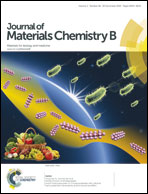Site-specific immobilization of DNA on silicon surfaces by using the thiol–yne reaction†
Abstract
Covalent immobilization of ssDNA fragments onto silicon-based materials was performed using the thiol–yne reaction. Chemical functionalization provided alkyne groups on the surface where the thiol-modified oligonucleotide probes can be easily photoattached as microarrays, reaching an immobilization density around 30 pmol cm−2. The developed method presents the advantages of spatially controlled probe anchoring (by using a photomask), direct attachment without using cross-linkers, and short irradiation times (20 min). Hybridization efficiencies up to 70%, with full complementary strands, were reached. The approach was evaluated by scoring single nucleotide polymorphisms with a discrimination ratio around 15. Moreover, the potential applicability of the proposed methodology is demonstrated through the specific detection of 20 nM of a genomic target of bacterial Escherichia coli.


 Please wait while we load your content...
Please wait while we load your content...